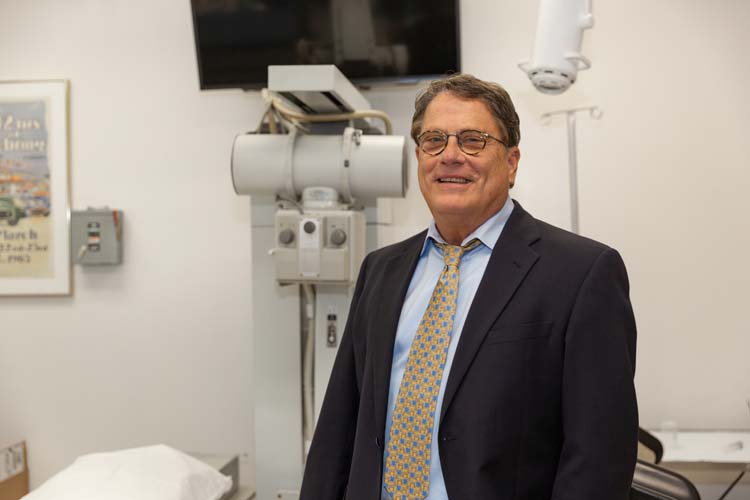
Depending on which source you look to, bladder cancer ranks as the fifth, seventh or eighth most commonly diagnosed cancer in the United States.
The American Cancer Society estimates about 82,000 new cases of bladder cancer will be identified this year. The Center for Disease Control and Prevention puts that figure at 72,000, and the Mayo Clinic’s estimate is 68,000.
Dr. Robin Atwell at Vero Urology, however, is clearly more concerned with cures than he is with head-counts.
Given the demographics of Vero Beach, that’s a good thing, since all the above sources agree that bladder cancer occurs mainly in older adults.
Roughly nine in 10 of those diagnosed with this disease are over the age of 55 and the average age at the time of diagnosis is 73.
On the plus side, Atwell says he has seen treatments for bladder cancer evolve exponentially over the course of his 30-year career. He seems particularly inspired by an ongoing clinical trial being conducted by medical oncologist Dr. Stephen Patterson at the Scully-Welsh Cancer Center that already has benefited one of Atwell’s patients.
This particular patient, Atwell recalls, first came to him in 2006 at the age of 79.
“She presented with blood in her urine [the most common symptom of bladder cancer], which is called hematuria, and we found a high-grade transitional cell carcinoma.
“It was a large tumor and how we treated those tumors historically, when they’re not invasive into the muscle wall, is by resecting them and then starting patients on immunotherapy with BCG,” or bacillus calmette-guerin, a germ related to the one that causes tuberculosis.
“It’s an attenuated live bacteria and it tricks the bladder into thinking there’s a bacteria that it needs to make an immune response to. The immune response that results from the BCG in the bladder also builds an immune response to treat bladder cancer cells.”
But it seems you can only trick Mother Nature for so long.
As Atwell explains, “after about five years or so, [the patient] developed urgency frequency, a small-capacity bladder and recurrent urinary infections because the bacteria we were putting in there were injuring her own immune responsiveness.
“Her bladder had become contracted and she started to, again, develop persistent carcinoma in situ.”
After “staving off” the patient’s tumor for over a decade, and with her now in her 90s, her immune system had become less able to recognize and fight the tumor in her bladder. Something had to change.
The woman had not been treated with radiation because, as Atwell puts it, “with bladder cancer, radiation is more palliative than it is curative. In other words, it will shrink these tumors down, but removing the tumor is the most important thing.”
Happily, once Atwell’s patient enrolled in the clinical trial at Scully Welsh that involves the Roche Pharmaceutical drug Tecentriq, her situation improved.
By November of last year, her bladder biopsies showed no sign of cancer for the first time in more than a decade.
“I last looked in her bladder a week and a half or two weeks ago and she still has no cancer,” says Atwell.
The results experienced by one patient in a clinical trial involving thousands of other patients are statistically irrelevant, of course, but they matter a lot if you happen to be that one patient.
Dr. Robin Atwell is with Vero Urology at 1355 37th Street, Suite 303. The phone number is 772-569-7606.



